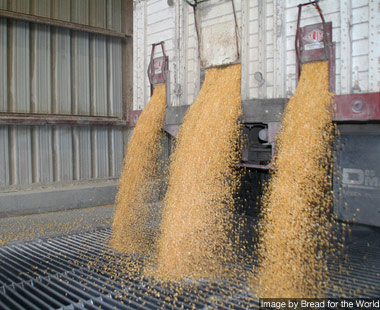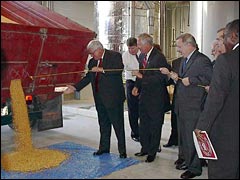economy
-
How oil-intense is your state’s economy?
Last time I checked, oil prices were hovering just below $100 per barrel. This reminds me of something I used to obsess about: high oil prices hit some places harder than others.
All else being equal, oil-efficient economies are more insulated from oil price shocks than are economies that require large oil inputs to function. I'm not talking about the amount of oil consumption, but about the "oil-intensity" of an economy. New York state consumes a lot of oil, and it also produces a lot of wealth. Other states, such as Louisiana, consume a lot of oil, but don't produce anywhere near as much wealth per unit of energy. (In fact, New York produces five times as much wealth per barrel of oil as Louisiana.)
Just so, when oil prices skyrocket, Rhode Island suffers less pain than Texas. And Massachusetts feels less of a pinch than Wyoming. So at the risk of oversimplification, I'll propose a little schema for the future:
- If the future is likely to bring high oil prices, and
- we'd like to remain prosperous, then
- we should probably start weaning our economies from petroleum.
Brilliant, I know.
I guess one potential lesson here is that our big capital investments shouldn't expose us to decades of oil price shocks. (Yeah, I'm talking to you, highway.) They should insulate us from high oil prices. (Oh, hi there, compact walkable neighborhood.)
So, how do all 50 states stack up? Find out below the jump ...
-
It can happen here
Recently Hale "Bonddad" Stewart, who normally writes informative posts about finance, let loose with a string of myths about manufacturing (both at Huffington Post and Daily Kos) that really got my blood boiling. Nothing like boiling blood to get those fingers moving, I always say! So I thought I would address various myths, most of which Bonddad managed to touch on. Also, I figure that some clarifications might be in order for those that read both my post on the necessity of manufacturing and Ryan Avent's spirited challenge.
Bonddad's myths: a strong U.S. manufacturing base will be bad for trade, is an artifact of World War II, is not necessary for high-tech industries or a thriving middle class, depends on low-cost labor, and ultimately, is not possible.
-
Pro-business vs. pro-market
Much of the debate around the big issues of our day -- from energy to healthcare -- hinges on whether one is "pro-market" or "pro-government," with Cato and the Wall Street Journal op-ed page lining up on one side and any number of PIRGs on the other.

Unfortunately, neither side appears to understand the pro-market position. Herewith, my attempt to add a bit more rigor to the debate.
So what does a market look like? At the most basic level, a market is defined by its characteristics. There are various definitions out there, but they all come down to the same basic tests:
- No barriers to entry
- No barriers to exit
- Price transparency (e.g., prices reflect costs)
- No participants can independently affect price
Meet these tests and Adam Smith's magic starts to work, whereby the self-interest of each participant leads to social benefit for all in the form of better products and services, at lower prices. Why? Because life in a perfect market sucks! If you're running a firm in a market as defined above, you don't sleep well at night. New entrants keep cropping up. If you can't stay competitive, you're going to lose your money. Tiny changes in raw material costs have big impacts on your profits, which you are completely powerless to change. This causes you to do two things:
-
Why gutting subsidies shouldn’t be the focus of Farm Bill reform efforts
A lot of people, myself among them, have spent substantial time this year trying to demystify the 2007 Farm Bill. But as it lurches into its stretch run — with passage possible by year-end — I fear that the bill is more shrouded in mystery than ever, even among sustainable-agriculture advocates. The answer ain’t blowin’ […]
-
It’s time for a real ‘food vs. fuel’ debate
Can U.S. farmers keep filling the nation’s bellies as they scramble to fuel its cars? Given its evident gravity, the question has drawn remarkably little debate. Like it or not, though, more and more food is being devoted to fueling the nation’s 211-million-strong auto fleet. High gasoline prices, a dizzying variety of government supports, and […]
-
An environmental-justice advocate responds to the biofuels boom
I am very excited to see this Grist series, because I am a biodiesel user. I am also very worried about the growth of the biofuels industry, because I am an environmental-justice advocate, and I see this industry rapidly leaving my community behind. What happens after the photo shoot? Photo: house.gov The growth of the […]
-
Report spells out high economic costs of climate chaos
Peter Madden, chief executive of Forum for the Future, writes a monthly column for Gristmill on sustainability in the U.K. and Europe.
While the U.S. was absorbed in the midterm elections, a major report on the economics of climate change was launched in the U.K. The weighty "Stern Review" -- 700 pages in all -- was the work of Sir Nicholas Stern, ex-chief economist at the World Bank. Produced at the behest of the chancellor, Gordon Brown, it has had a profound impact on political and business attitudes in this country.
This is not surprising when the headline message of the report is that climate change could shrink the global economy by a fifth, equivalent to the Great Depression of the 1930s.
Stern's analysis shows that taking action now will cost an average of 1 percent of global GDP a year over the coming decades, whilst not acting will cost between 5 and 20 percent of GDP a year over the same time frame.
-
What’s the real cost of climate change, and where do all those numbers come from?
As serious governments shift the climate-change debate from whether the phenomenon exists to the best means to combat it, one of the first things officials want to know is how much economic damage it will cause — and how much measures to fight it might cost. It is the trillion-dollar question, and figures are flying […]
-
Big Ethanol …
... wins again.
House Majority Leader John Boehner's attempt to lower the ethanol tariff (and thus allow ethanol-hungry oil refineries to purchase ethanol from overseas) has gone down in flames:


